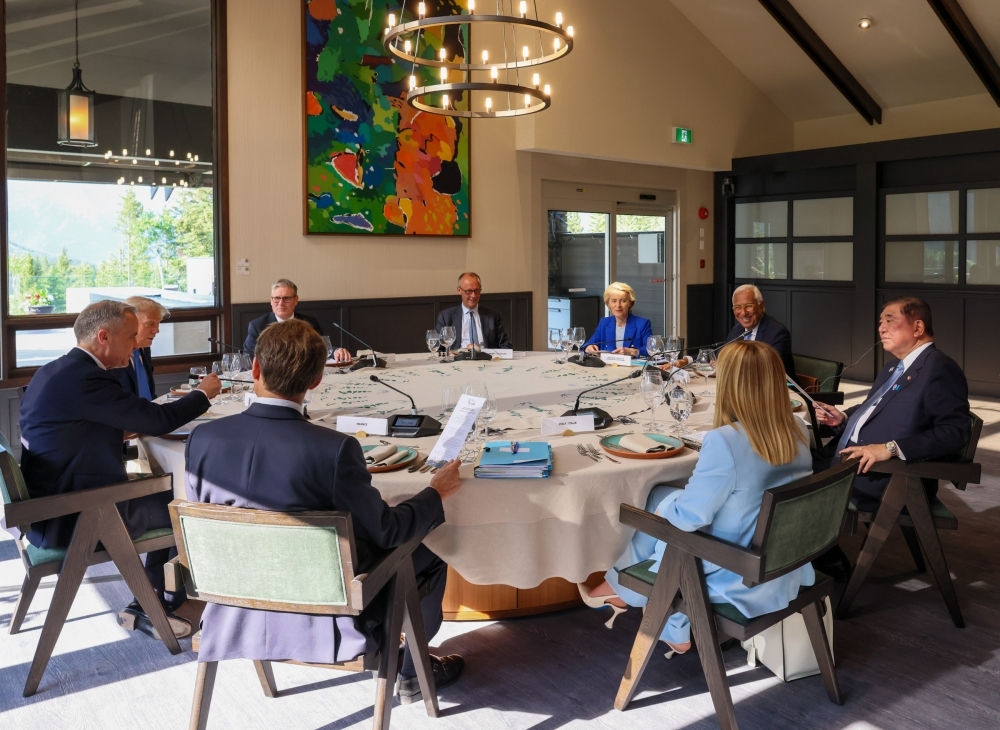G7
G7 Kananaskis Summit
Overview of Session 4 “Making the world secure”
June 16, 2025
 (Photo: Cabinet Public Affairs Office)
(Photo: Cabinet Public Affairs Office)
On June 16, commencing at 6:35 p.m. (local time. 9:35 a.m. on June 17, Japan time.) for approximately 110 minutes, Mr. ISHBA Shigeru, Prime Minister of Japan, attended the G7 Kananaskis Summit Session 4 “Making the world secure”. The overview is as follows.
- In this session, at a time when the international community is facing a turning point, the G7 countries had a candid exchange of views on international issues, including the situation in Ukraine, the Middle East and the Indo-Pacific.
- Ukraine
- Prime Minister Ishiba emphasized that achieving an early comprehensive ceasefire and the realization of a just and lasting peace are the common objectives for G7 and stressed that unity of the G7 is important to prompt swift, positive, and concrete actions from Russia.
- Furthermore, Prime Minister Ishiba pointed out that the peace to be achieved in Ukraine could impact the international order, including the Indo-Pacific region, and emphasized the importance of establishing a peace framework that deters a renewed aggression.
- Regarding support for Ukraine, Prime Minister Ishiba expressed Japan's continued support for Ukraine in coordination with the G7 and that Japan would continue sanctions against Russia.
- Prime Minister Ishiba further expressed serious concern over the advancement of military cooperation between Russia and North Korea, including the deployment of North Korea’s troops to Russia. The G7 members shared the concern over China's support for Russia's war sustainability.
- Middle East
- Situation surrounding Israel and Iran
Prime Minister Ishiba highlighted the importance of diplomatic efforts to de-escalate the situation. Prime Minister Ishiba also stated that development of nuclear weapons by Iran is unacceptable and the leaders reaffirmed the importance of resolving the nuclear issue through dialogue. - Gaza
Prime Minister Ishiba stated that loss of civilian lives in Gaza was unacceptable, and then urged all parties to return to negotiations, not to resort to military means, and to sincerely work towards a lasting ceasefire and the release of hostages. Prime Minister Ishiba emphasized that Japan would continue closely collaborating with G7 partners as well as relevant international organizations.
- Situation surrounding Israel and Iran
- Indo-Pacific Situation
- The G7 leaders engaged in a candid exchange of views on the Indo-Pacific situation and related challenges, recognizing their significant impact on international peace, stability, and prosperity.
- Prime Minister Ishiba emphasized the importance of increased G7 engagement in the region, drawing on his meeting with many Asian countries since assuming office and the voices of Asia he has lent an ear to. The G7 leaders reaffirmed to work together in addressing issues related to China. They expressed concern over the various challenges including the advancement of North Korea's nuclear and missile development, and reaffirmed to continue to closely coordinate their policies toward these issues.

